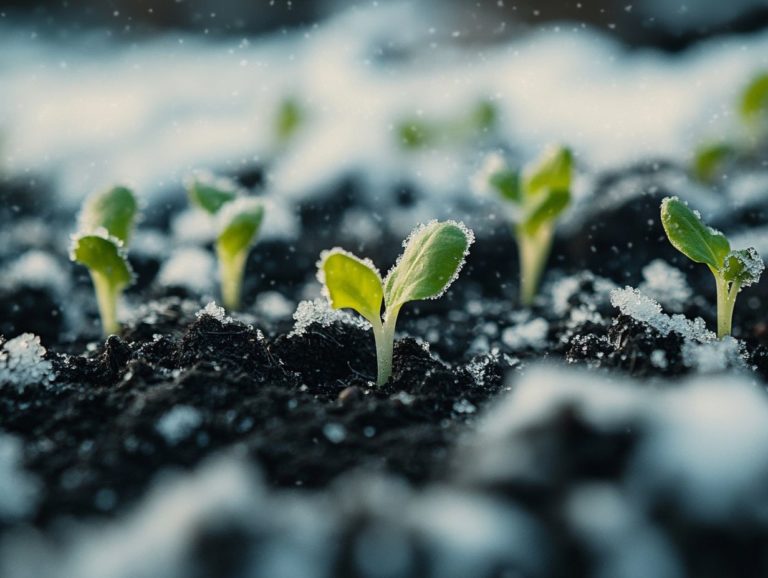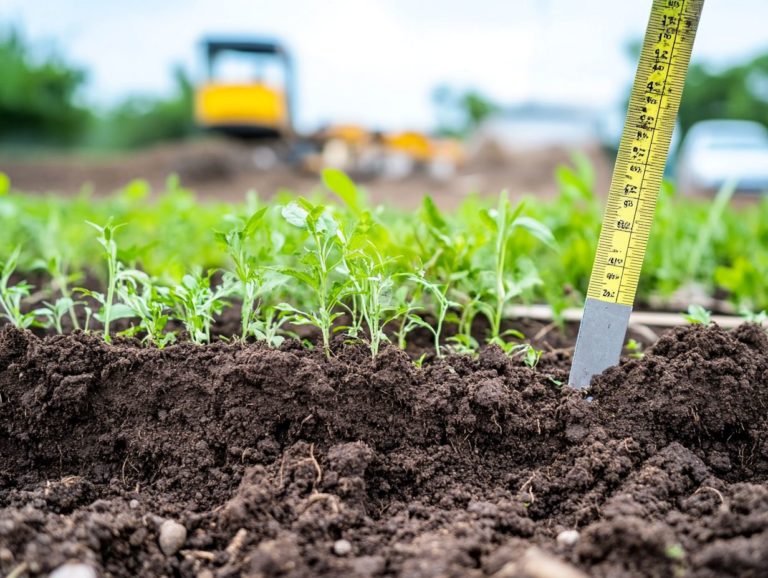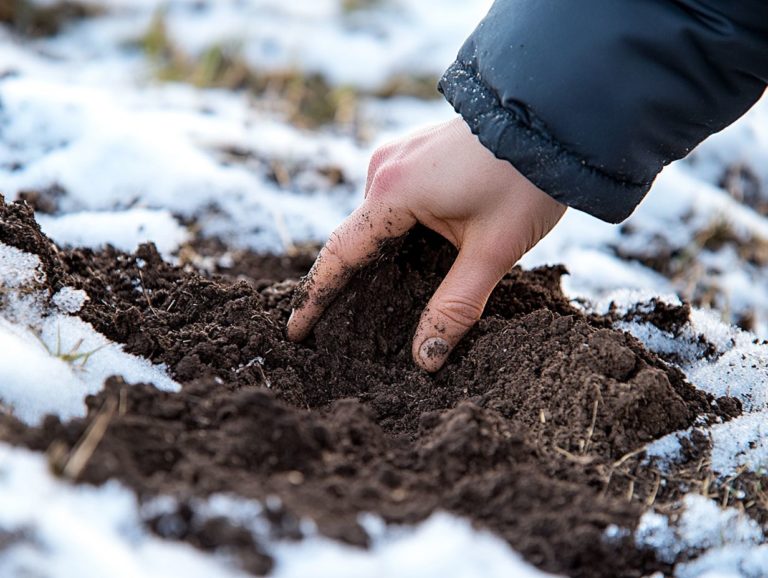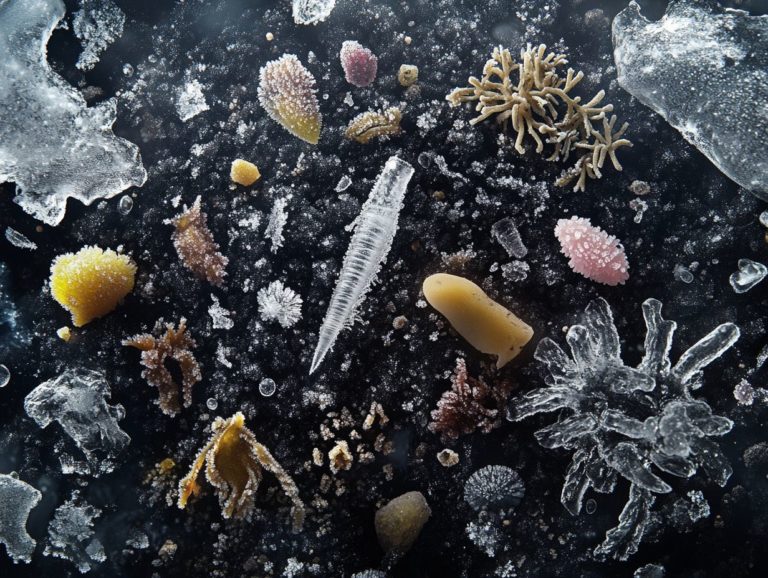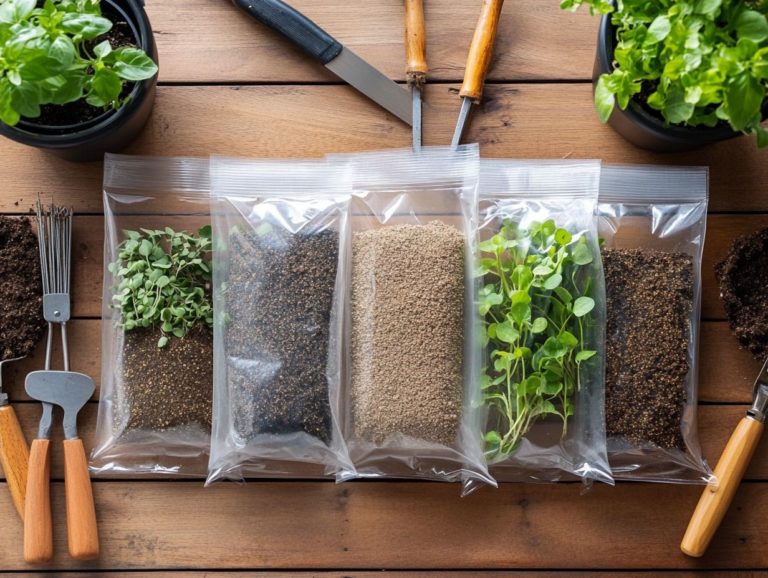Best Organic Amendments for Cold-Weather Soil
If you aim to enhance the vitality of your cold-weather soil, organic amendments are truly your allies!
These natural additions not only improve soil structure but also boost nutrient availability, making them indispensable for flourishing gardens in brisk climates.
This guide delves into the finest organic amendments that can elevate your garden soil into a nutrient-dense sanctuary.
You ll discover their benefits, application tips, and common pitfalls to avoid, all designed to ensure your plants thrive even in the frostiest conditions.
Contents
- Key Takeaways:
- 1. Compost
- 2. Manure
- 3. Cover Crops
- 4. Bone Meal
- 5. Fish Emulsion
- 6. Seaweed
- 7. Coffee Grounds
- 8. Alfalfa Meal
- 9. Wood Ash
- 10. Vermicompost
- 11. Green Manure
- 12. Blood Meal
- 13. Kelp Meal
- 14. Peat Moss
- 15. Pine Needles
- What Are Organic Amendments and Why Are They Important for Cold-Weather Soil?
- Frequently Asked Questions
- What are the best organic amendments for cold-weather soil?
- Why are organic amendments important for cold-weather soil?
- Can I use chemical fertilizers instead of organic amendments for cold-weather soil?
- How often should I add organic amendments to my cold-weather soil?
- Are there specific types of organic amendments that work best for certain plants?
- Can I make my own organic amendments for cold-weather soil?
Key Takeaways:
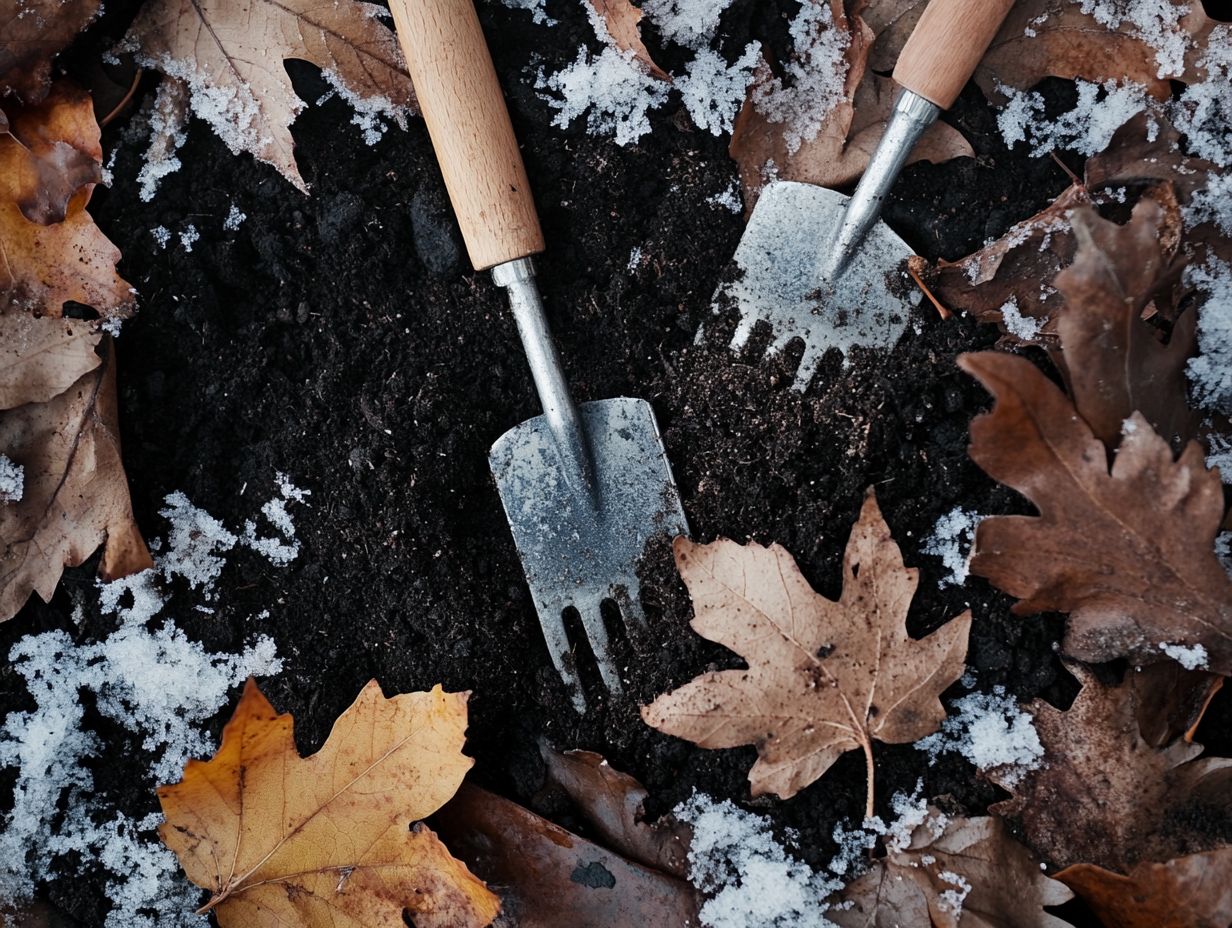
Compost and manure are fantastic for your garden! They boost nutrients and retain moisture, making your soil healthier.
Cover crops also protect and enrich the soil during winter months. They prevent erosion and provide a natural source of nitrogen for future plantings!
Avoid using wood ash or coffee grounds in cold-weather soils, as they can disrupt the soil’s pH balance and potentially harm plants. It’s important to research and understand the soil needs for cold-climate plants before choosing an organic amendment.
1. Compost
You can make compost a cornerstone of your sustainable gardening! It serves as a rich source of organic matter that boosts soil fertility and creates healthy soil structures in all your planting areas, from vegetable gardens to flower beds.
You can create it through various methods, such as using a composting bin and incorporating organic materials like kitchen scraps, leaves, and grass clippings. This ensures that beneficial organisms thrive in your garden.
By enriching your soil with these valuable nutrients, compost supports robust microbial life, essential for breaking down organic materials and making nutrients more accessible to your plants. This natural process also enhances water retention, allowing your garden to flourish even during dry spells.
As a home gardener, explore different types of compost, including vermicompost and hot composting, to discover which method suits your needs best. Regularly turning your compost and maintaining the right balance of greens and browns will speed up decomposition, resulting in nutrient-rich compost that can turn any garden into a vibrant ecosystem!
2. Manure
Composted manure stands as a powerhouse among organic fertilizers! It enriches your garden soil with essential nutrients while enhancing its structure and aeration, making it an essential component of any organic gardening approach.
Different types of manure, such as cow, chicken, and horse, each bring their own unique nutrient profiles to the table. For example, chicken manure is particularly rich in nitrogen, vital for promoting lush, leafy growth in your plants. Cow manure, on the other hand, provides a well-rounded mix of nutrients and helps retain moisture in the soil.
When you incorporate composted manure into your soil, you re not just feeding your plants; you re cultivating an environment that encourages the growth of beneficial fungi and microorganisms. This thriving ecosystem enhances nutrient availability and boosts soil fertility, creating a symbiotic relationship that benefits your plants!
As a result, you ll not only witness improved plant growth but also foster greater variety of plants and animals in your garden, leading to a healthier and more productive gardening experience overall.
3. Cover Crops
Cover crops are essential in your organic gardening journey! They enhance soil fertility, prevent erosion, and suppress weeds, contributing significantly to the overall health of your garden soil throughout the fall months and into spring planting.
Crops like clover, rye, and buckwheat don t just improve soil structure; they also boost nutrient levels, making them essential for sustainable agriculture. For example, clover acts as a fantastic nitrogen-fixing cover crop, enriching the soil organically. Rye shines with its rapid growth and dense canopy, providing excellent weed suppression.
By strategically implementing cover crops in your crop rotation plans, you can further enhance soil properties. These crops break pest cycles and improve moisture retention, ensuring that when it s time to plant your main crops, they benefit from a well-prepared and nutrient-rich soil base!
Start implementing these organic amendments now for the best results in your garden!
4. Bone Meal
Bone meal is a premium organic fertilizer crafted from animal bones, offering essential phosphorus and calcium that encourage robust root development and overall plant vitality.
This natural amendment can elevate soil fertility significantly, making it an invaluable addition to any garden bed. When you incorporate bone meal into your soil, it doesn t just provide vital nutrients; it also cultivates a thriving ecosystem of microbial life and beneficial fungi.
These microorganisms are essential for breaking down organic matter, improving nutrient availability, and enhancing soil structure. By blending bone meal into your garden beds, you effectively support your plants nutritional needs while fostering a balanced soil environment that promotes healthy growth and strengthens resilience against diseases.
5. Fish Emulsion
Fish emulsion is a powerhouse organic fertilizer crafted from fish byproducts, delivering a harmonious blend of macro and micronutrients that elevate plant growth and enrich soil health. It’s an excellent choice for lawn care.
This natural fertilizer is especially advantageous for those who prioritize sustainability and natural gardening methods in their gardening endeavors. By integrating fish emulsion into your gardening routine, you not only supply essential nutrients like nitrogen, phosphorus, and potassium but also nurture the vibrant microbial ecosystems within your soil.
The amino acids and beneficial trace minerals found in fish emulsion significantly enhance soil vitality, fostering the development of diverse microbial life. This boost in microbial activity facilitates nutrient cycling, the natural process where nutrients move through the soil and plants, ensuring that your plants receive a consistent supply of nutrients while simultaneously improving soil structure and water retention.
The result? A garden that is not only robust but also remarkably resilient.
6. Seaweed
Seaweed serves as a remarkable organic fertilizer, brimming with a wealth of nutrients and growth hormones that nurture beneficial organisms in the soil while promoting robust plant growth.
You’ll find that various types of seaweed, like kelp and dulse, are particularly celebrated for their distinct advantages. Kelp, for instance, not only enhances soil structure but also boosts its moisture retention capabilities, making it an exceptional choice for gardens in drought-prone areas.
Dulse, on the other hand, is loaded with trace minerals that invigorate root health and overall plant vitality. By incorporating these natural fertilizers into your soil, you can cultivate a thriving ecosystem that fosters beneficial microbial activity, ultimately leading to greater nutrient availability and stronger, more resilient plants, ideal for autumn gardening.
7. Coffee Grounds
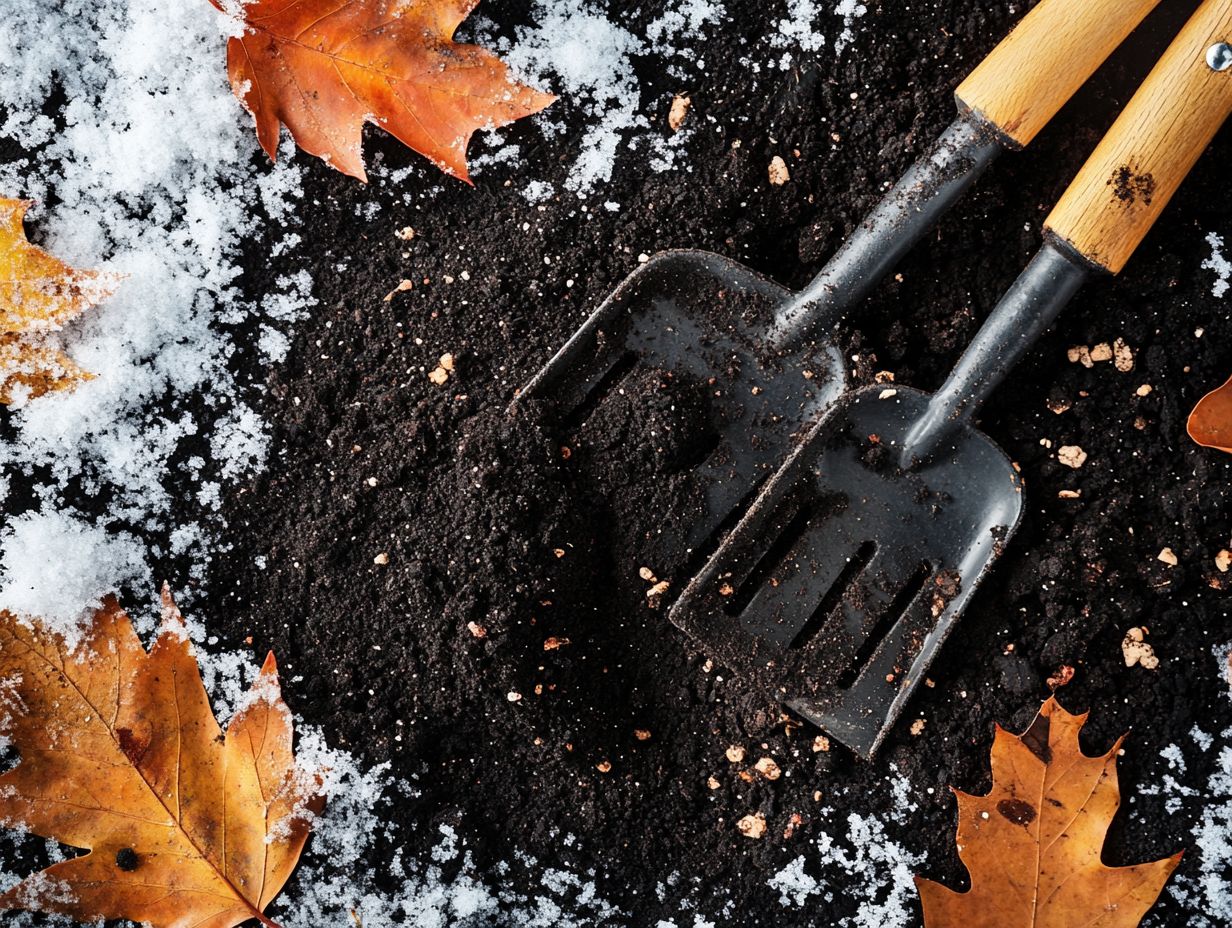
Coffee grounds are a treasure trove of organic material, perfect for your gardening endeavors. They provide a rich source of nitrogen, which significantly enhances soil fertility and supports the growth of beneficial organisms.
Adding these spent grounds to your garden beds is a breeze. As they break down over time, they improve soil structure, boosting drainage and aeration. This creates a more hospitable environment for plant roots to absorb essential nutrients.
By attracting earthworms and beneficial microbes, coffee grounds foster an ecosystem that thrives on biological activity, aiding in nutrient cycling. The enriched microbial life not only promotes a healthier garden but also bolsters plant resilience, enabling them to flourish under various conditions.
Start using coffee grounds in your garden today for amazing results! Incorporating coffee grounds into your gardening routine is thus a straightforward yet powerful method to rejuvenate your garden, especially when used as top dressing.
8. Alfalfa Meal
Alfalfa meal is a fantastic organic fertilizer. It s packed with nitrogen, which boosts soil fertility and helps plants grow strong. This versatile amendment fits seamlessly into various gardening applications, from vegetable patches to flower beds, providing the nutrients your plants need.
When mixed into the soil, it elevates nitrogen levels and introduces vital micronutrients like calcium and potassium, crucial for overall plant health. As it breaks down, alfalfa meal truly transforms your soil by improving moisture retention and nurturing a thriving community of helpful soil creatures.
With its natural benefits, it s an invaluable asset for your gardening endeavors.
9. Wood Ash
Wood ash is a great natural soil booster. It s full of potassium and trace minerals. By incorporating it into your soil, you can significantly enhance its fertility and foster vibrant plant growth.
Beyond boosting nutrient availability, wood ash also improves soil structure, enhancing aeration and water retention. When applied thoughtfully, it raises the pH of acidic soils, creating a balanced environment for various plants.
This natural resource also stimulates helpful microbial activity, essential for nutrient cycling. This process helps break down organic matter and releases vital elements into the soil. As a gardener, you can harness the power of wood ash as an organic fertilizer or mulch, enjoying its many benefits while promoting sustainability in your gardening practices.
10. Vermicompost
Vermicompost enriches your soil with nutrients. Made from decomposed organic matter by earthworms, it enhances soil structure while promoting the growth of beneficial organisms vital for healthy soil.
The process begins with the introduction of red wigglers and other composting worms into a well-managed blend of kitchen scraps, yard waste, and other organic materials. As these industrious worms feast on the matter, they transform it into a rich, dark substance brimming with key nutrients like nitrogen, phosphorus, and potassium.
This natural fertilizer not only boosts soil fertility, but also fosters a thriving microbial community, playing a crucial role in breaking down organic materials and improving overall soil health. By incorporating vermicompost into your garden soil, you can expect improved plant growth, heightened resistance to pests and diseases, and enhanced water retention. It truly stands as an invaluable resource for gardeners and farmers.
11. Green Manure
Green manure is an effective way to boost soil. These cover crops are grown to be tilled back into the earth, providing essential nutrients and improving soil structure. They play a crucial role in sustainable gardening practices.
Plants like clover, vetch, and rye not only add organic matter to boost soil fertility, but they also help prevent erosion, suppress weeds, and promote biodiversity.
Each type of green manure comes with its own set of benefits; for instance, legumes fix nitrogen in the soil, vital for plant growth, while grasses excel at enhancing soil aeration and drainage.
By integrating these cover crops into your crop rotation strategies, you can significantly maximize soil health and fertility, ensuring your land remains productive and resilient for the long haul.
12. Blood Meal
Blood meal is a powerful organic fertilizer. It provides nitrogen, which is essential for plant growth and enhancing soil fertility.
Be careful not to overdo it your plants will thrive if you use it wisely! When applying blood meal to your garden beds, it s best to use it sparingly. Its concentrated nature can lead to nutrient burn if you apply too much.
Typically, gardeners mix it into the top few inches of soil, ideally before planting, to ensure effective integration of its nutrients. This method boosts nitrogen availability and improves soil structure, creating a thriving environment for beneficial microorganisms.
These tiny helpers are vital for nutrient cycling and soil health, helping with the breakdown of organic matter and enhancing overall soil vitality, which in turn supports a vibrant ecosystem in your garden.
13. Kelp Meal
Kelp meal is a fantastic natural soil amendment made from seaweed. It s packed with nutrients and growth hormones that boost plant growth and soil health.
This organic amendment provides essential minerals and improves soil structure. It helps soil retain water and air, giving your plants a steady supply of vital elements.
It also promotes beneficial microorganisms in the soil. These microorganisms support healthy root development and plant resilience. The result is a flourishing garden with improved yields and robust plants.
14. Peat Moss
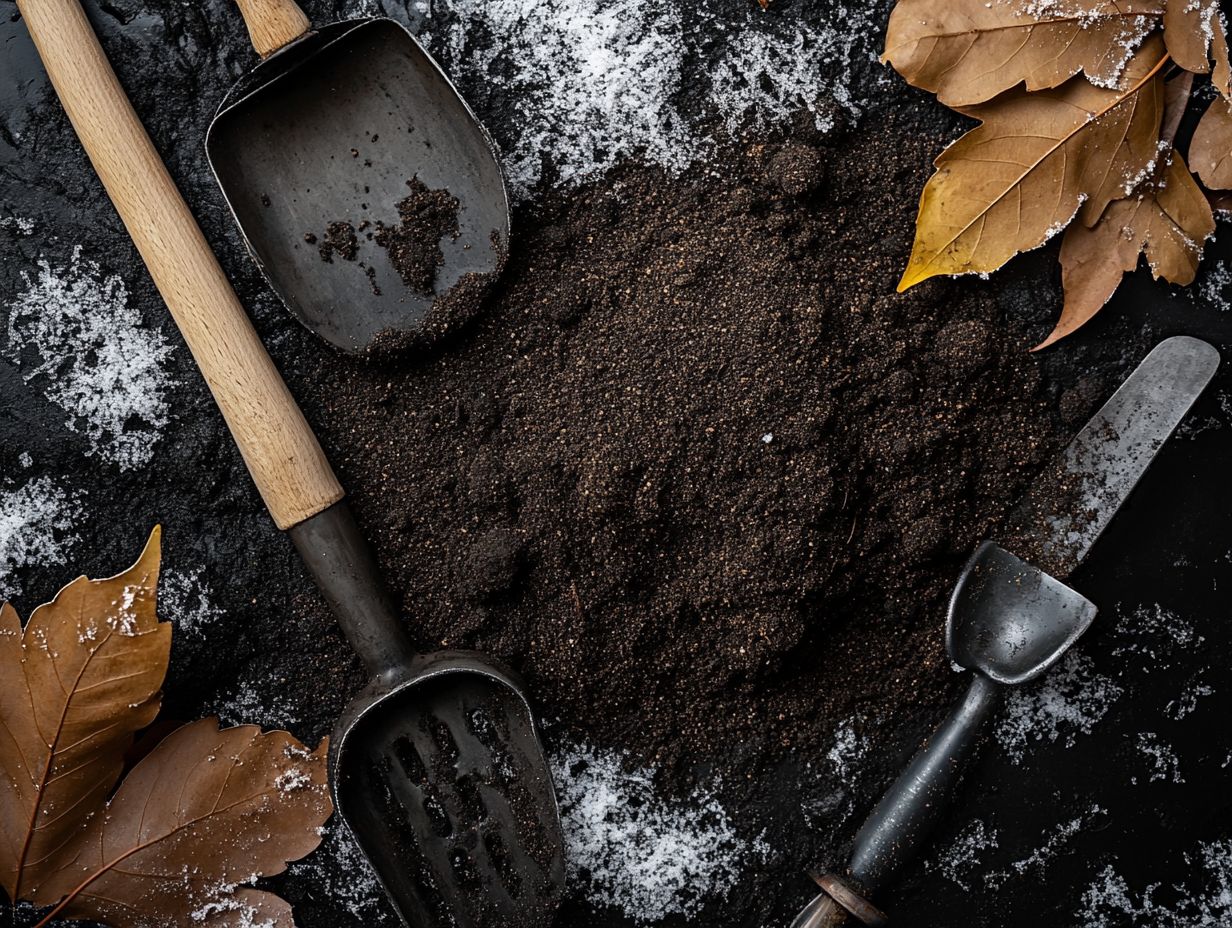
Peat moss is an organic treasure in gardening. It enhances soil structure and water retention.
When mixed into the soil, it boosts fertility. As it breaks down, it releases essential nutrients vital for plant growth.
Peat moss also creates a habitat for beneficial microorganisms. This vibrant ecosystem helps decompose organic matter, promote nutrient cycling, and keep pathogens away.
Including peat moss in your soil amendment strategies leads to improved resilience and vigor in your plants. It s a must-have for a flourishing garden.
15. Pine Needles
Pine needles make excellent mulch for your garden soil. They improve water retention, control weeds, and release nutrients as they decompose.
They also affect soil acidity, benefiting acid-loving plants like blueberries and azaleas. This natural mulch protects moisture levels and prevents soil erosion.
As they break down, pine needles enrich the ecosystem. They provide habitats for beneficial microorganisms and earthworms, boosting nutrient availability and improving soil structure.
What Are Organic Amendments and Why Are They Important for Cold-Weather Soil?
Organic amendments are natural materials added to soil to improve its fertility, structure, and health. They are vital for cold-weather soil, especially when learning how to amend clay soil for cold-climate gardening, which battles nutrient depletion and harsh growing conditions.
Using amendments like compost, manure, and other biodegradable materials enhances nutrient availability. These materials make soil structure better, allowing for improved drainage and aeration.
Without these organic inputs, it s tough to maintain nutrient balance and support healthy plant growth. This can lead to a garden that lacks vibrancy and productivity.
How Do Organic Amendments Improve Soil Health?
Organic amendments are your secret weapon for elevating soil health. They dramatically enhance microbial life, boost nutrient levels, and are essential for preparing your soil for spring in cold climates, fostering the natural cycles crucial for vibrant plant growth.
Consider incorporating amendments like compost, manure, and green manures into your soil. These additions introduce a rich array of organic matter that nurtures a flourishing community of beneficial microorganisms. These microscopic allies are essential in breaking down organic materials and releasing the vital nutrients that your plants crave for optimal growth.
By improving soil structure and aeration, these amendments facilitate superior water retention and drainage. This transformation makes your soil ecosystem more resilient, enabling it to support a diverse range of plant life and ultimately creating a healthier environment. The dynamic interactions among these organisms further promote the process of nutrients moving through the soil, ensuring that essential resources are always available for your plants throughout the growing season.
What Factors Should Be Considered When Choosing Organic Amendments for Cold-Weather Soil?
When selecting organic amendments for your cold-weather soil, keep in mind key factors like soil properties, nutrient analysis, and the specific needs of the plants you plan to grow. For effective results, consider using soil amendments effective for cold climates. This ensures that the amendments you choose effectively enhance soil fertility.
Make sure to assess how well these amendments fit with your soil! A good match is essential for health. For instance, certain organic materials can significantly improve water retention, making them invaluable for drier areas, while others excel at enhancing drainage in heavy clay soils.
Taking a thoughtful approach to evaluating these criteria can lead to a well-balanced ecosystem that supports robust plant growth and optimizes resource use. This allows you to create a flourishing garden even during the coldest months.
How Often Should Organic Amendments Be Applied?
The frequency with which you apply organic amendments hinges on several factors, including the health of your soil, the specific crops you re nurturing, and the seasonal fluctuations that influence nutrient levels, particularly in cooler gardening climates.
Regular applications are key to thriving plants! Typically, applying amendments bi-annually in the spring and fall can help create a balanced nutrient profile, ensuring that beneficial microorganisms flourish in your soil.
Utilizing compost or well-rotted manure during these vital seasons promotes vigorous plant growth, particularly when your crops require an extra nutrient boost. If you’re cultivating annual plants, incorporating amendments into the soil before planting lays a strong foundation for optimal growth.
Meanwhile, perennials may thrive with lighter, more frequent applications throughout the growing season to keep nutrients readily available.
What Are the Common Mistakes When Using Organic Amendments for Cold-Weather Soil?
When using organic amendments for cold-weather soil, you might encounter common pitfalls like over-application, neglecting soil testing, and overlooking the specific nutrient needs of your plants. To avoid these issues, it’s important to follow guidelines on how to build healthy soil in cold climates. These mistakes can significantly hinder both soil health and plant growth.
Without a solid grasp of your soil’s existing nutrient profile, you could unintentionally introduce too much of certain amendments, leading to nutrient imbalances that do more harm than good. It s essential to recognize that not all amendments are created equal; some may take their sweet time decomposing in cooler temperatures, which can limit their immediate effectiveness.
By planning for seasonal variations and regularly fine-tuning your application strategies, you can maximize the benefits of organic matter. This ensures your crops flourish even during the frosty months. Considering natural fertilizers for cold-climate gardens allows you to cultivate healthier soil and more vigorous plants in your cold-weather garden.
Frequently Asked Questions
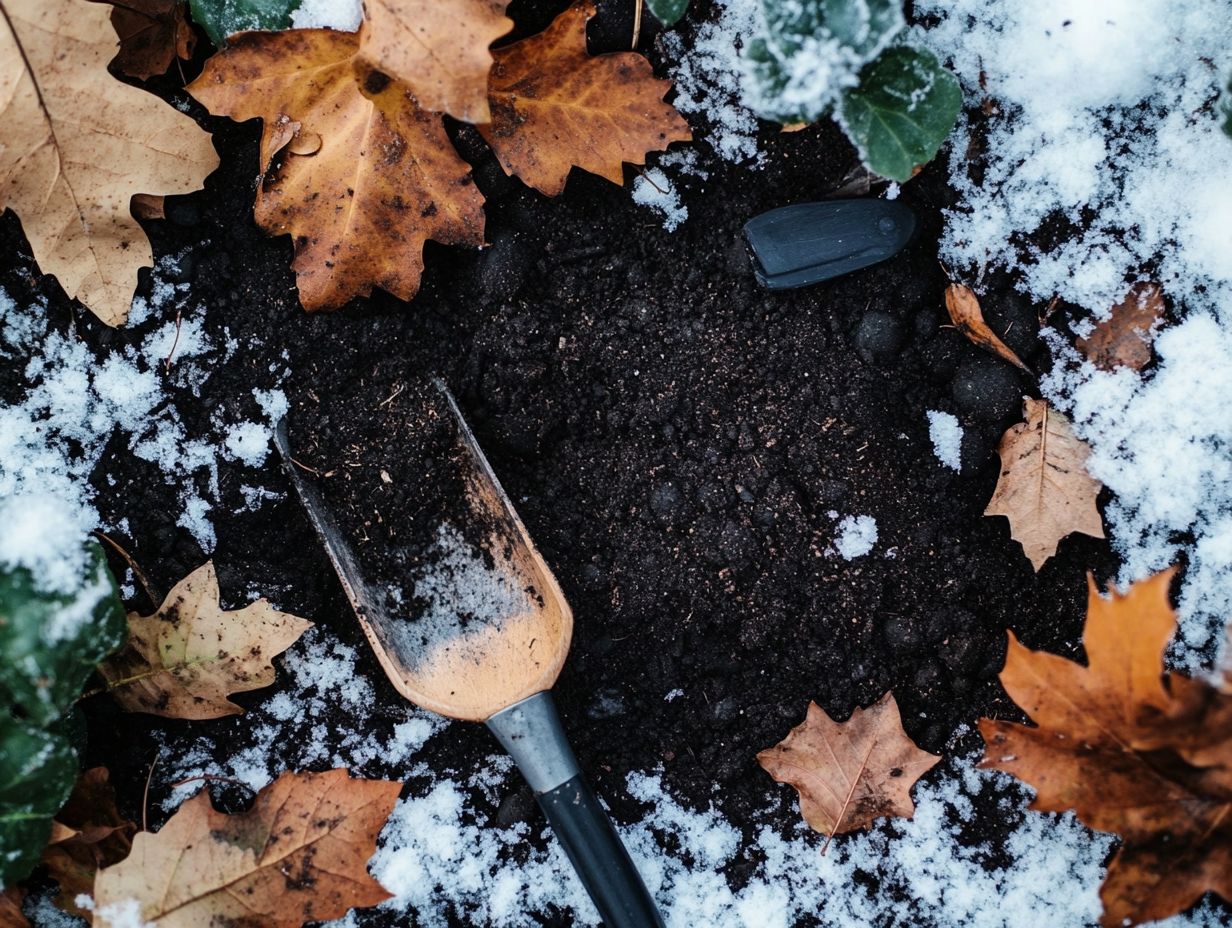
What are the best organic amendments for cold-weather soil?
Some of the best organic amendments for cold-weather soil include compost, aged manure, leaf mold, and top soil amendments for cold-weather gardens like seaweed.
Why are organic amendments important for cold-weather soil?
Organic amendments boost soil health and fertility, which is crucial in colder weather when plants struggle to thrive. Learning how to amend soil for cold climates can make a significant difference in your garden’s success.
Can I use chemical fertilizers instead of organic amendments for cold-weather soil?
Chemical fertilizers offer quick nutrients but can disrupt soil balance. For lasting soil health, stick with organic amendments.
How often should I add organic amendments to my cold-weather soil?
The frequency depends on your soil’s needs, but adding organic amendments once or twice a year is ideal. Fall is a great time for this addition!
Are there specific types of organic amendments that work best for certain plants?
Yes! Acidic-loving plants thrive with peat moss, while nutrient-rich crops prefer aged manure. Choose the right amendment for your plants!
Can I make my own organic amendments for cold-weather soil?
Absolutely! You can create compost or leaf mold from kitchen scraps and yard waste. This is a cost-effective and eco-friendly way to enhance your soil!


